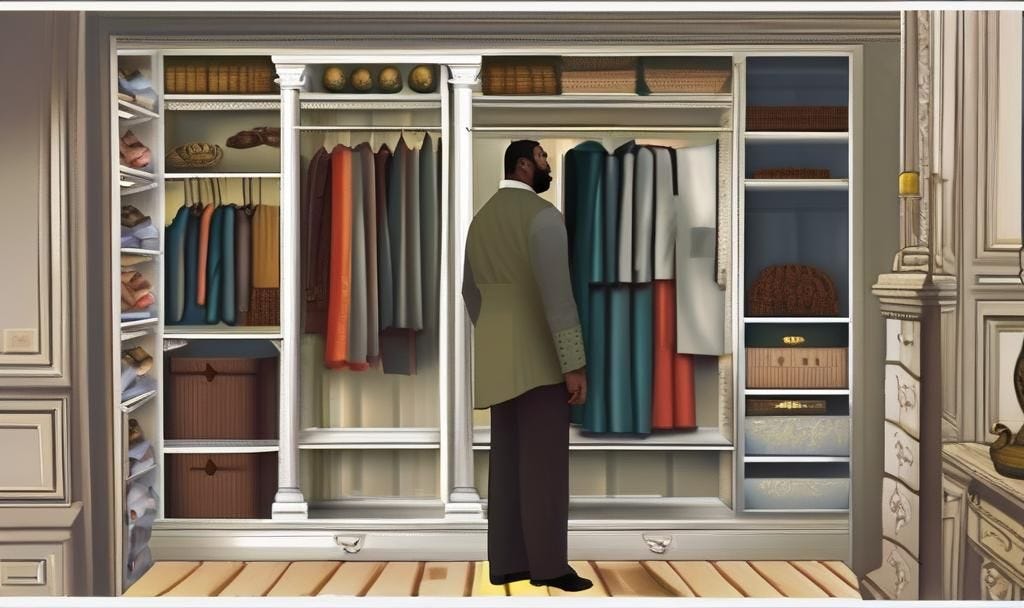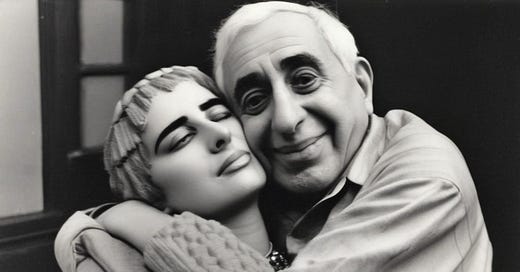Writing prompt: Does a character’s power lie in their capacity to be hurt?
feat. thoughts on Harold Bloom and Shakespeare
Content note: the following Substack contains reference to Shakespeare. I have a pet theory that Shakespeare might actually be quite good, and if we want to improve our writing then he might have something to teach us. Proceed accordingly.
I spent a slightly feverish Sunday driving from the Scottish Borders to London, with an interlude at Bury St Edmunds’ brilliant literary festival, where I shared a stage with two of my favourite contemporary authors, Kate Sawyer and Kirsty Capes. A treat. As is the case on any long solo car journey, the main enemy to be vanquished was boredom, which necessitates a good audiobook.
My audio companion on my journey back* was Harold Bloom’s lectures (Shakespeare: The Seven Major Tragedies, which you can listen to for free on Audible’s Unlimited catalogue). Now, I know that Harold Bloom isn’t particularly groovy in literary circles, for some perfectly good reasons (vague, too reverential, possibly a bit of a dirty old man), but I developed a huge affection for him over the course of eight hours. His erudition. His enthusiasm. The way he referred in passing to Cleopatra in Antony and Cleopatra as ‘Cleo’ and then, catching himself, said, ‘I’m just so terribly fond of her, you see.’ Harold Bloom loved Shakespeare, and that makes me love Harold Bloom.
It’s quite an experience to steam through Shakespeare’s tragedies in one gulp. It was an opportunity to think about the tragedies individually, but also to make connections between them (probably the sorts of connections that scholars would frown upon, but Shakespeare belongs to me just as much as he does to the scholars). And, as the tired mind will do when it’s got nothing in front of it but a hundreds of miles of motorway and Hazza B for company, I started to develop one of my grand unifying theories.
Grand unifying theories are silly by definition, because actually life is just too complicated and various to be encapsulated neatly, and Shakespeare is the most complicated and various of all writers. But writers love grand unifying theories because they’re a way into writing. They give form and purpose to the formless enterprise of writing, which otherwise feels so overwhelmingly infinite that making any meaningful choice is impossible. But all theories about writing, including all the ones that I spout on this Substack, are really just modest proposals, hypotheses waiting to be disproven, potential tools for your toolbox. A theory of writing craft is useful insofar as it’s the right tool for the job, and in this case, the job is thinking about character.
And the tool that I propose is this: is a character’s depth a measure of their capacity to be hurt?
Notice that the question is not ‘what hurts your character?’ but rather, how deep is the character’s capacity to be hurt, and how does that affect how we feel about them?
The germ of this thought emerged from Bloom reading out the final scene from Othello (N.B. Bloom’s second lecture on Othello is basically just him reading Act 5 out loud. One of the things that made me love him was the way he observed gravely, at the beginning of the lecture, that the murder of Desdemona by Othello is the most distressing moment in all of Shakespeare. Therefore, he said, ‘We must proceed with this reading very slowly and gently.’).

There was one line that I’ve encountered dozens of times (I studied Othello at A Level, and I’ve seen every filmed version in circulation because my A Level English teacher lacked the inclination to actually teach us). After Emilia has discovered Desdemona’s body and Othello has remorselessly confessed, she rages against him and he draws his sword on her.
Emilia, the lady-in-waiting, faces down Othello, the armed general, with the breathtaking rebuke:
Thou hast not half that power to do me harm
As I have to be hurt.
Hearing Bloom read out this line brought tears to my eyes. Prior to this scene Emilia is many things: a jaded wife, a slightly bawdy lady-in-waiting, a semi-accomplice to Iago’s treachery. Yet in this moment she becomes magnificent, a truth-teller (‘I will not charm my tongue. I am bound to speak.’). Her ability to tell the truth derives not from righteousness, but from fury of grief. In articulating the depths of her own capacity to suffer, she makes Othello shallow in comparison - he cannot hurt her in any measure greater than her own capacity to be hurt. She has nothing to lose, and is untouchable.
It made me think about the way that, for Shakespeare’s characters, the capacity to be hurt is part of what makes them so alive. We delight in Hamlet for his intelligence, but the prince that we see in the play is a version forged in devastation at the loss of his father (‘Oh, that this too-too solid flesh would melt’). All his antics, all his musings, all his insight, they’re all the result of his capacity to feel pain. Macbeth allows himself to become an amoral shell, so numb that he has ‘almost forgot the taste of fears’), yet the death of his wife jolts him into recognising that the whole regicide and usurpation was a farce (‘Out, out, brief candle. Life’s but a walking shadow.’). He still has the capacity to be hurt. King Lear’s capacity to be hurt is boundless - he is completely undone by his daughters’ rejection and his own humiliation, and then when Cordelia dies he is undone all over again. His soft underbelly, his potential to be wounded, has no end.
We see the capacity to be hurt as a fundamental character principle even in the lighter plays. Malvolio’s humiliation in Twelfth Night lands because we feel him to be truly devastated. Henry’s rejection of Falstaff in Henry V (‘I know thee not, old man’) precipitates a devastation commensurate with the vastness of Falstaff’s character. In The Merchant of Venice, Shylock cites the capacity to be hurt as perhaps the defining human trait:
Hath not a Jew eyes? Hath not a Jew hands, organs, dimensions, senses, affections, passions; fed with the same food, hurt with the same weapons, subject to the same diseases, healed by the same means, warmed and cooled by the same winter and summer as a Christian is? If you prick us do we not bleed? If you tickle us do we not laugh? If you poison us do we not die?
I’m not a Shakespeare scholar and this isn’t a PhD thesis. I’m a writer, trying to learn from the greatest writer there ever was. And so now I will pack up my grand unifying theory, add it as a tool to my toolbox, and going ahead, when I craft a character, I will ask myself, what is the depth of this character’s capacity to be hurt?
*On my way up to Scotland my companion of choice was Stephen King’s It, which, while superbly performed by Steven Weber, could not be saved from its interminably baggy middle. The opening act had me salivating, but fourteen hours in I was beyond bored. As someone on Reddit pointed out, this was a novel written by someone who had done way too many lines of coke.
Some quick recommendations
Jan Carson’s new short story collection, Quickly, While They Still Have Horses. I had the pleasure of hearing Jan speak today at the University of Bristol (sometimes my job is pretty rad) and I was so struck by her gift for verbal, as well as written, connection, and her generosity towards her audiences. She said something that fascinated me - she sees her short stories as parables. Yet unlike Biblical parables they work on a character and psychological level. I had my undergraduates read Settling in preparation for hearing her speak. They loved it, and I loved it too.
Charlie Cooper’s Myth Country. Like everyone else, I have no idea whether this —umentary is of the doc or mock variety. All I know is that Charlie Cooper is a wizard, a prince and a sage. Come for the folklore, stay for him threatening to call the police on a prospective dogger.
Nigella’s gochujang orzo. I’ve been making this every Tuesday, late at night after I arrive back in London after a long day teaching in Bristol. It’s basically a bastardized and quicker tteokbokki, in that it’s carbs in a spicy starchy gochujang-based sauce. There’s something so fortifying on long teaching days about knowing that I can cook myself something delicious within twelve minutes of arriving home (I didn’t buy pre-chopped frozen shallots because that feels Versailles levels of decadence, but I did pre-chop a load of shallots and put them in a bag in the freezer, which now feels like the most extraordinary act of self-love). You can make it even more spoonable and substantial and delicious by adding a load of frozen peas. I’m writing this on the train home from Bristol, and I feel so soothed in the knowledge that that’s what I’ll be eating tonight.




